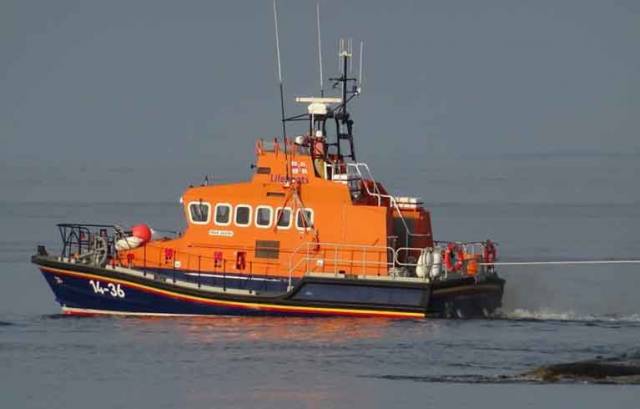Donaghadee RNLI volunteer crew were paged three times over the weekend to assist a 24m fishing vessel which had run aground, a 31–ft yacht with three people onboard which had broken down and a small speedboat on the rocks at Millisle.
The first launch was requested by Belfast Coastguard on Saturday last (23 June) at 7.32pm following a 999 call by a member of the public reporting that a fishing vessel had run ashore on the north side of the ‘Perch’, located just of the Warren Road in Donaghadee.
Donaghadee RNLI’s all-weather lifeboat Saxon was on scene to the fishing vessel within five minutes. After consultation with the crew of the fishing vessel, which had five people onboard, and establishing that the boat had no damage, the crew of the 14m Trent class lifeboat attached a towline to the stern of the fishing boat to attempt to pull it off the rocks. The towline was then moved to the bow of the boat in another attempt to remove her from the rocks. With the assistance of the casualty vessel dropping its trawl doors to the seabed to jettison some weight, using both their bow thrusters and main propulsion to assist, the vessel came free and the lifeboat was able to tow it to deep water.
When the skipper of the fishing boat was satisfied that there was no obvious damage to the hull or propeller the towline was removed and retrieved and the vessel continued her passage south while the lifeboat returned to station.
The second launch of the weekend for the volunteer crew was when their pagers were alerted at 3.02pm at the request of Belfast Coastguard to assist 30ft yacht which had broken down approximately four nautical miles east of Donaghadee Harbour with three men onboard. The inboard auxiliary engine had failed so the crew established a towline and a course was set for Donaghadee were the yacht was secured at the visitors' berth by 4pm.
Five hours later at 8.03pm, the crew were paged again and requested to launch to assist a small speedboat with two people onboard on the rocks at Millisle. Launching the lifeboat at 8.10pm, Saxon proceeded at full speed to the scene as crew members readied the Trent class’s daughter boat to prepare to the need to get close to the shallow area where the casualty boat was stranded. As the lifeboat reached the area the Coastguard rescue team advised that a canoe in the vicinity had managed to tow the boat ashore and both the vessel and its crew were safe and well.
Speaking following what was a busy weekend for Donaghadee RNLI, Peter Irwin, Lifeboat Operations Manager said: ‘In the first call out of the weekend, our Coxswain and crew managed to refloat the fishing vessel just before high tide in difficult circumstances due to the restricted location of the grounding, size of the vessel and the direction the vessel was pointing. We were delighted to get her refloated relatively quickly and the intense training which the volunteer crew undertake regularly was of no doubt put into full practice. The further two calls on Sunday were more straightforward thankfully.
‘We would remind everyone going to sea and particularly as we approach the summer holidays and enjoy this good weather, to respect the water. Always wear a lifejacket, always carry a means of communication and tell someone ashore where you are going and when you are due back. Should you get into trouble dial 999 or 112 and ask for the Coastguard.’































































